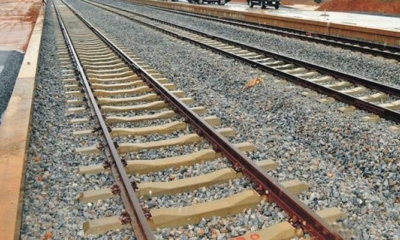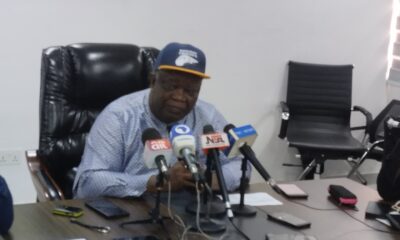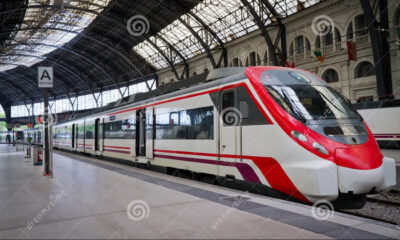Railway
State trains: Plateau, Niger, Osun, Borno set to join Lagos, FCT

State trains: Plateau, Niger, Osun, Borno set to join Lagos, FCT
Plateau, Niger, Borno and Osun states are among state governments currently making arrangements to run train services within their respective areas.
They are joining Lagos State Government and the Federal Capital Territory already operating and managing mass transit train services for the people in those places.
This is coming after the railway development and operation was moved from the exclusive legislative list to concurrent allowing states and private sector to be involved in the business.
Managing Director of the Nigerian Railway Corporation, Fidet Okhiria, disclosed this in Lagos on Tuesday during a public lecture.
Okhiria spoke as a guest lecturer at the endowed professorial chair on Transport and Logistics at the Lagos State University (LASU) on ‘From exclusive clause to concurrent list: Potency for sustainable rail infrastructure development in Nigeria and the Lagos State Example’.
He commended the Lagos State Government and the Federal Capital Territory, Abuja, two subnational governments for effectively initiating and running mass transit trains.
He said it was part of the fallout of moving the railway development from the exclusive list to current as signed into law in March 23, 2023 by the ex-President Muhammadu Buhari.
Already, he said the Plateau State Government had commenced a trial run of its stage-managed train service.
Okhiria said, “Lagos State is one of the states already operating a mass transit train in Nigeria. The Lagos Blue Line is a standard gauge track operating between Mile 2 and Marina…The service has greatly reduced the traffic jam usually experienced at Marina to Orile and Mike 2 axis, especially usually during peak hours.
“Lagos State is presently at an advanced stage of commenting the Red Line from Agbado to Oyingbo. We are currently inspecting and certifying various operating equipment along the corridor for safety concerns. When the service commences, it will greatly impact the way Lagosians travel.
“Other states are already keying in before now, using our track access tool to negotiate a train service within their corridor.
“Notable among them included Plateau State Government, already operating on trial runs, Niger State (talks ongoing), Borno State (talks ongoing), Osun State Government (hire service during festivities) and the Federal Capital Territory (FCT) currently restated, to mention a few.”
The NRC boss recalled that the prior to the constitutional amendments, was both a sole operator and regulator of rail activities in the country.
He cautioned states against dropping standards due to the high cost involved in building railway infrastructure, which he noted could affect safety.
Okhiria said the NRC would continue to offer necessary technical advice and other input to ensure adherence to uniform global standards in railway development and management.
He urged private investors to key into the project in the area of running trains, both passengers and freight.
Vice-Chancellor of LASU, Prof. Ibiyemi Tunji-Bello, represented by the VC Administration, Prof. Adenine Omotunde Boyo, said that the removal of railway from exclusive to concurrent list would empower the states to invest massively railway business and boost the intermodal transport system.
She commended the initiative of the Lagos State Government for completing and commencing daily commercial train service from Mile 2 to Marina.
Speaking on the professorial chair endowment in the transport studies at LASU, Prof. Dele Badejo said it was the first of its kind in transport development and sustainable development in sub-Sahara Africa.
He said, “This guest lecture is historic because it is the first time that the endowment has gathered and assembled stakeholders and intellectuals in the rail transport sub-sector to brainstorm and provide a road map for the repositioning and improving various activities and infrastructure on rail transportation.”
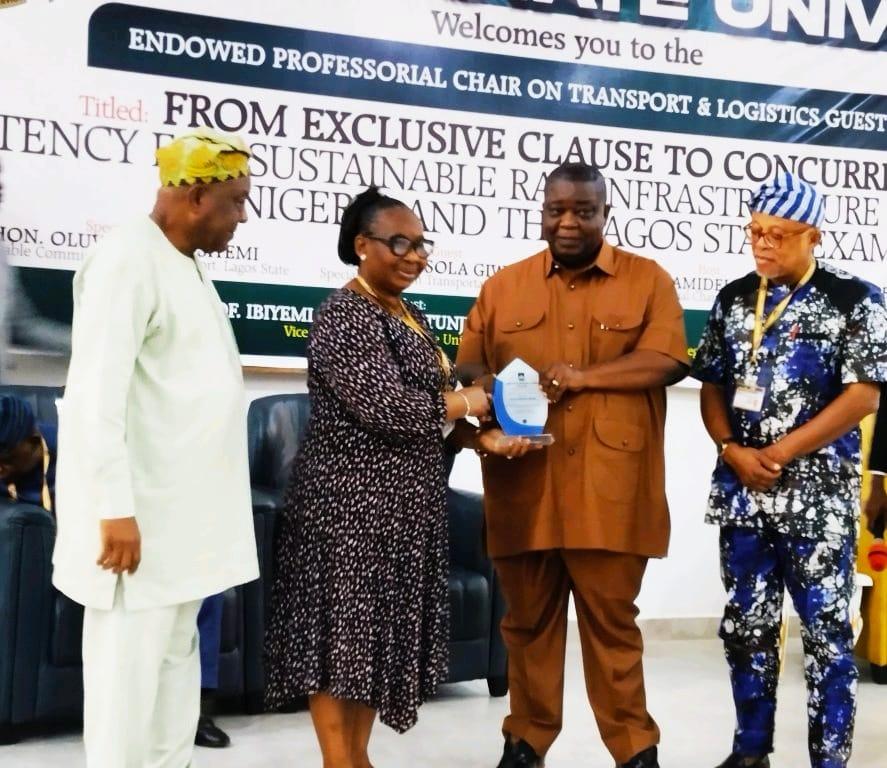
Railway
Railway track vandalism: Urgent need for laws prohibiting scrap/metal picking to protect critical assets
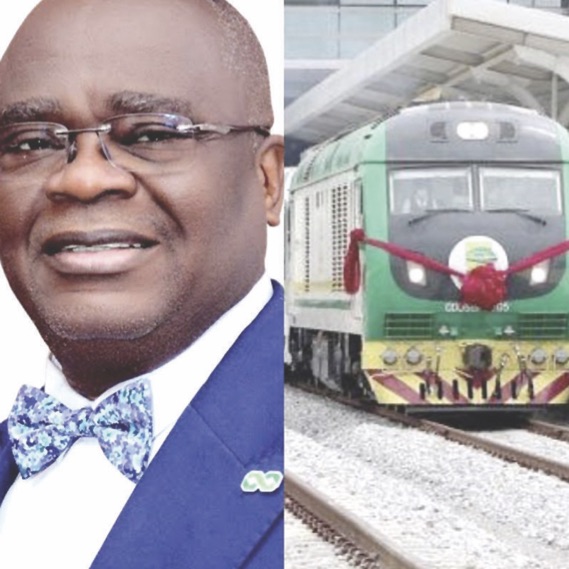
Railway track vandalism: Urgent need for laws prohibiting scrap/metal picking to protect critical assets
By Onyedikachi Stanley Onovo
The wanton destruction and theft of Nigeria’s railway infrastructure and other critical public assets represent one of the gravest threats to national development and security.
Across the nation—from the Warri-Itakpe line to Abuja-Kaduna, the Eastern and Western Districts, Lagos-Ibadan, and throughout the Northern network—vandals systematically dismantle tracks, steal armoured cables, and pillage essential equipment. This crisis demands an immediate and robust legislative response.
The unending menace
The vandalism is perpetrated by a network of individuals, from local miscreants (“iron condemn”) to organised merchants who purchase and export stolen materials. Security reports and countless arrests underscore the scale of the problem:
In December 2023, a private security firm arrested 13 suspects for vandalising Abuja Mass Transit Rail assets. The suspects were said to be casual workers engaged by a Chinese company working on the railways, but said to have used the opportunity to steal the materials.
On June 2024, The Cable reported that the Nigerian Army arrested 47 suspected rail track vandals in Kaduna State.
In October 2025, police arrested a suspect vandalising railway electrical installations also in Kaduna State.
Radio Nigeria in December 2025 announced the arrest of three persons in Kwara State for vandalizing and stealing Railway clips and nuts in Offa.
In May 2021, TVC reported some individuals, including one Ejike Okeke were apprehended in Enugu with stolen sleepers and tracks.
On the 30th of January 2026 the Nigerian Television Authority reported that the NSCDC, Bauchi State Command arrested five suspects and intercepted a truck carrying vandalized railway tracks.
This relentless assault has plagued successive management of the Nigerian Railway Corporation (NRC), defying conventional counter-strategies.
A transformative leadership initiative
A pivotal shift began under the administration of President Bola Ahmed Tinubu with the appointment of Dr. Kayode Opeifa as Managing Director/CEO of the NRC.
Dr. Opeifa introduced a fundamental paradigm shift by redesignating what was carelessly termed “scrap” as “unserviceable critical national assets.”
This reframing has driven a transformative partnership with experts to manage these assets responsibly. The era of controversial public auctions—which often saw valuable national iron assets disappear, depriving Nigeria of materials for repurposing and industrialisation—is now over.
Today, a systematic process ensures these materials are reused or responsibly processed, with revenue reinvested into the Corporation. This home-grown solution is a commendable breakthrough that proves Nigerians can effectively solve national challenges.
The critical legislative gap: Targeting the market
While the NRC’s internal reforms are laudable, they alone cannot stem the tide. The root enabler of this vandalism is the thriving, unregulated market for stolen metal. To kill the vandal’s incentive, we must eradicate the demand.
Therefore, there is an urgent need for the National Assembly to enact legislation that:
1. Prohibits the buying and selling of any railway materials (serviceable or unserviceable) on the open market.
2. Imposes severe penalties on buyers and merchants of vandalised public assets, effectively targeting the economic drivers of this crime.
3. Mandates stringent federal regulation of all scrap metal dealers nationwide.
THE SCRAP DEALER NEXUS
The opaque operations of scrap dealers are a major concern. Their compounds are often shrouded, hiding the provenance of their materials. This unregulated space fuels not only railway vandalism but also community theft—from iron crossing bars in homes to street lamp holders.
Trailers loaded with questionable materials move freely from cities and expressways to unknown destinations. Without regulating this sector, our fight against vandalism remains superficial.
CONCLUSION
The partnership and innovation under Dr. Opeifa’s leadership at the NRC demonstrate what is possible with commitment and vision.
However, to secure our railways, power installations, and other critical assets, we must complement this institutional resolve with strong, deterrence-based law. Legislation that dismantles the market for stolen public property is not an option; it is a national imperative for Nigeria’s security and industrial future.
*Onyedikachi Stanley Onovo, Ph.D
FCAI, ANIPR
onyedikachionovo1@gmail.com excellentdikachi@yahoo.com
Entertainment
NRC, Entertainers Finalise Plans for 2026 Valentine Train Ride

NRC, Entertainers Finalise Plans for 2026 Valentine Train Ride
A team of leading Nigerian artistes and entertainment executives has paid a courtesy visit to the Managing Director of the Nigerian Railway Corporation (NRC), Kayode Opeifa, ahead of the 2026 Valentine Love Train experience.
The delegation included celebrated musician Sunny Neji, Managing Director of Ojez Entertainment Limited, Joseph Odobeatu, and veteran vocalist Yinka Davies.
The high-profile visit formed part of final preparations for the Valentine-themed train ride scheduled for Saturday, February 14, 2026, at the Mobolaji Johnson Train Station.
Dr. Opeifa received the artistes and commended the creative industry for choosing the national rail system as the venue for the annual Valentine event. He noted that the partnership reflects growing public confidence in the corporation’s safety standards, operational improvements, and renewed focus on customer experience.
READ ALSO:
- 2027 General Elections: INEC Announces February 20 for Presidential Poll
- EFCC Nabs Three in Borno Over Viral ₦500 Naira Mutilation Video
- Omokri Accuses El-Rufai of Rights Abuses During Kaduna Governorship
“The 2026 edition aims to deliver an unforgettable experience while deepening public engagement with the rail service,” Opeifa said, reaffirming the NRC’s commitment to providing secure and efficient transport for passengers during special events.
Organisers disclosed that this year’s edition will feature an expanded entertainment lineup, including performances and appearances by Charles Inojie, Yinka Davies, Sunny Neji, and Segun Arinze. Guests are expected to enjoy live music, comedy, a couple’s game show, fashion showcases, and special performances throughout the Lagos–Ibadan–Lagos train ride, culminating in a Valentine banquet ball.
The Valentine Love Train has in recent years become a fixture on the NRC’s festive calendar, attracting couples, families, and leisure seekers with its blend of travel, romance, and entertainment. The initiative also aligns with ongoing efforts by the corporation to promote rail transportation as a viable and enjoyable alternative for intercity travel.
With final logistics being fine-tuned, organisers say the 2026 edition promises to combine safety, comfort, and premium entertainment for participants.
NRC, Entertainers Finalise Plans for 2026 Valentine Train Ride
Railway
LASG Moves to End Years of Flooding in Ebute-Meta Railway Corridor
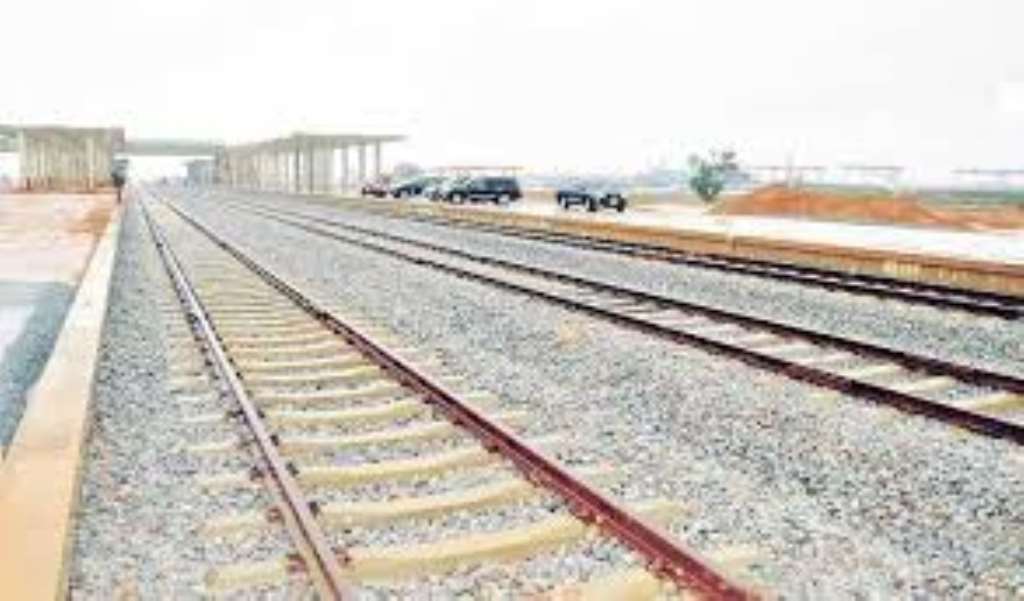
LASG Moves to End Years of Flooding in Ebute-Meta Railway Corridor
The Lagos State Government has taken steps to address persistent flooding within the Ebute-Meta railway corridor and adjoining communities with the construction of a major stormwater drainage channel in collaboration with the Nigerian Railway Corporation.
The NRC said the state government had awarded a contract for the construction of the Carter-Railway Channel, also known as System 4, aimed at deflooding the railway compound as well as parts of Olaleye and neighbouring areas within Lagos Mainland Local Government Area.
The reinforced concrete drainage channel will run from Murtala Muhammed Way in Ebute-Meta through the railway corridor to a discharge point at Iponri on Western Avenue.
Speaking at a stakeholders’ meeting held at the railway premises, the Director of Drainage Services at the Lagos State Ministry of Environment and Water Resources, Engr.
READ ALSO:
- Outrage Mounts Over ‘Ministry of Sex’ Proposal Ahead of General Election
- Nollywood in Mourning as Family Confirms Death of Actress Aunty Ajara
- Kwankwaso Condemns Kwara Massacre, Calls for Strong Federal Response to Terrorism
Adedapo Ajadi, said the project would permanently address the perennial flooding that has affected residents, institutions and businesses in the area for years. He added that construction work is expected to last about 18 months and urged stakeholders to cooperate with contractors to ensure smooth execution.
Stakeholders at the meeting included representatives of St Saviour’s School, NTA Channel 10, the Railway Museum, Federal Medical Centre Ebute-Meta, CCECC quarters, churches, mosques, as well as industrial and small business operators within the railway corridor.
Managing Director of the Nigerian Railway Corporation, Dr Kayode Opeifa, described the intervention as timely, assuring that the corporation would give full support to the multi-billion-naira project.
He noted that the infrastructure, when completed, would significantly reduce flooding and improve safety within the railway environment and neighbouring communities.
Some stakeholders welcomed the development, saying annual flooding had disrupted academic, medical and commercial activities in the area and posed risks to lives and property.
Officials of the Lagos State Government and the NRC later carried out a joint inspection of the proposed corridor to assess the alignment and identify areas that may be affected before construction begins.
LASG Moves to End Years of Flooding in Ebute-Meta Railway Corridor
-

 International2 days ago
International2 days agoCanada Opens New Express Entry Draw for Nigerian Workers, Others
-

 Politics18 hours ago
Politics18 hours agoPeter Obi Launches ‘Village Boys Movement’ to Rival Tinubu’s City Boys Ahead of 2027
-

 News3 days ago
News3 days agoKorope Drivers Shut Down Lekki–Epe Expressway Over Lagos Ban (Video)
-

 News1 day ago
News1 day agoPolice to Arrest TikToker Mirabel After She Recants False Rape Claim
-

 Health3 days ago
Health3 days agoRamadan Health Tips: Six Ways to Stay Hydrated While Fasting
-

 Entertainment3 days ago
Entertainment3 days agoActress Destiny Etiko Breaks Silence on Alleged Nollywood Betrayal
-

 metro2 days ago
metro2 days agoOsun Awards 55.6km Iwo–Osogbo–Ibadan Road Project to Three Contractors
-

 International1 day ago
International1 day agoEpstein, Ex-Israeli PM Named in Alleged Profiteering From Boko Haram Crisis



